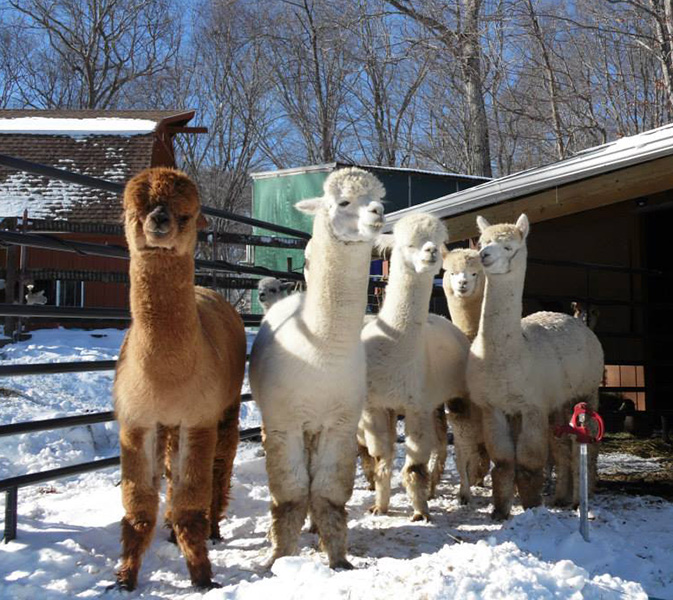About Alpacas
Alpacas are members of the camelid family. They are native to South America, particularly the Andes Mountains region of Peru, Bolivia, Chile and Ecuador. They are smaller than their cousins, the llamas, and because of this they are not used as pack animals, but rather for their valuable fiber.
Alpacas are very intelligent and curious animals. The two qualities allow them to quickly learn new things and adapt fairly quickly to new surroundings and happenings. This doesn’t mean that they like a lot of change and noise but rather that they can usually adapt to a new home and routine fairly quickly should they be bought or sold. Alpacas communicate with each other primarily by sounds and body posture. Body posture includes ear position and tail movement. The most common sounds that they make is a soft, short hum. They also have a warning call which sounds like a high-pitch, staccato screech. This warning call is often given by the herd leader when a foreign animal is seen outside their fences and puts the entire herd on high alert. A very important quality for those alpacas that are in the wild.
Alpacas are environmentally friendly in that each of their feet has two toes that have soft pads on the underside, similar to dogs’. For this reason, they do not tear up pastureland as do the hooves on horses and cattle. You may have heard that alpacas spit. Well, yes, they do, but it’s usually among each other to settle herd hierarchy or food sharing issues. Occasionally they will justifiably spit at humans when the humans are antagonizing them in some way.
What’s Needed to Raise Alpacas
When getting ready to welcome your new alpacas home, you will need to consider shelter and fencing. A barn, at a minimum a 3-sided shelter, is necessary to shield alpacas from summer sun as well as icy winter winds. Five foot high perimeter fencing is also required to keep out predators such as roaming dogs and coyotes. In areas where mountain lions and bears are common, higher (and in the case of bears, stronger) perimeter fencing will be needed. Alpacas thrive on pasture grass during the warmer months and grass hay when pasture is not available. Grain and a mineral supplement made especially for alpacas is also necessary. As with all animals, a constant supply of fresh water is necessary. Yes, they are relatives of the camel, but unlike the camel, alpacas cannot go for long periods of time without water.
More Info
If you feel that you would like to learn more about alpacas, please contact us.

